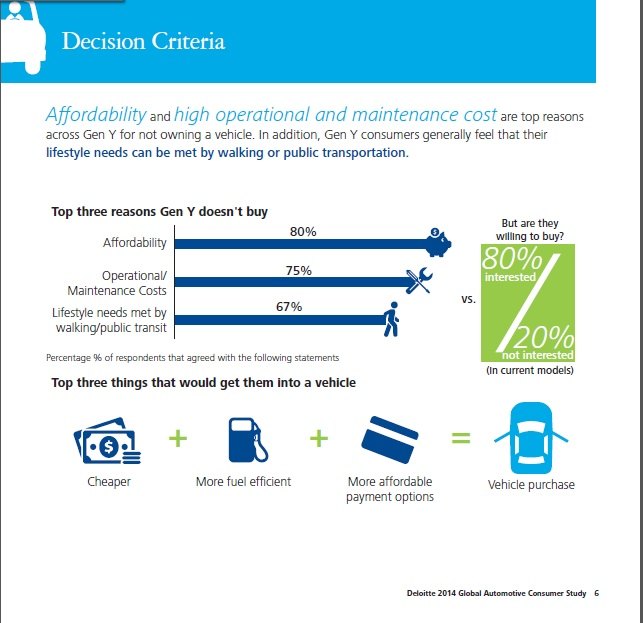Generation Why: Deloitte Study Shows That Money, Not Ideology Is The Biggest Obstacle To Car Ownership
One of the main criticisms of Generation Why is the lack of hard data to support this column’s ongoing thesis: that the lack of interest in car ownership among millenials is related to economics, rather than any sort of anti-car/pro-environment/pro-urban ideological shift among young people. Now, a key study from Deloitte confirms our initial hunch: young people want cars, but cannot afford them, and the notion of a car-free future, with walking, cycling and transit replacing the automobile (whether privately owned or shared via a service like Zipcar) is an unrealistic fantasy that somehow continues to have currency.
Deloitte’s annual Global Automotive Consumer Study surveyed 23,000 people across the globe, representing 19 different countries. The copy provided to TTAC focuses on the 2,000 Americans surveyed by Deloitte, with a subset of those (roughly 700) taken from “Generation Y”, born between 1977 and 1994.
The study’s findings largely confirm what Generation Why has maintained all along. According to the study, 80 percent of millennial surveyed say that affordability is the key factor keeping them out of a new vehicle, with maintenance costs coming in second place at 70 percent. On the other hand, 67 percent said that walking and other forms of transit were sufficient to meet their current lifestyle needs.
The current meme of new cars being homogenous, devoid of character and unappealing to younger buyers is at odds with Deloitte’s finding that 80 percent of consumers are interested in new models available on the market place. The study doesn’t say which models: many of us would love an Audi S4 or a Mustang 5.0, and find something like a Chevrolet Spark unappealing. Considering that Deloitte suggests cheaper, more fuel-efficient vehicles with more affordable payment options as a way of enticing younger buyers, it would appear that expectations may need to be tempered on the part of Gen Y buyers when looking for an affordable new car. The sense of wanting it all without having to pay for it is further reflected later in the study, with millennial buyers expressing a strong interest in advanced safety, infotainment and in-car connectivity features, but with only 27 percent willing to pay more than $2,500 for these features, while 21 percent are unwilling to pay anything extra to get them.
The cost of driving is a pervasive theme throughout. Gen Y drivers are three times as likely to give up their car if the cost of driving becomes too high, and would be willing to give it up if it conflicted with their lifestyle choice (like living in a walkable neighborhood where a car is a hassle or unnecessary). Even the desire for a hybrid powertrain (strong among Gen Y buyers) is motivated by cost savings rather than any sort of environmental consciousness, with 53 percent of young consumers telling Deloitte that saving money on fuel is their primary motivation for opting for alternative powertrains.
Even with affordability emerging as the key factor in getting younger buyers to purchase new cars, 92 percent of the those surveyed plan to buy a new car at some point, with 75 percent planning on purchasing one within 5 years. Based on Deloitte’s findings, it looks as if the mass abandonment of the automobile will continue to be a pipe dream for only the most radical anti-car types, but don’t look for it to disappear from public discourse any time soon.
More by Derek Kreindler
Latest Car Reviews
Read moreLatest Product Reviews
Read moreRecent Comments
- Kjhkjlhkjhkljh kljhjkhjklhkjh A prelude is a bad idea. There is already Acura with all the weird sport trims. This will not make back it's R&D money.
- Analoggrotto I don't see a red car here, how blazing stupid are you people?
- Redapple2 Love the wheels
- Redapple2 Good luck to them. They used to make great cars. 510. 240Z, Sentra SE-R. Maxima. Frontier.
- Joe65688619 Under Ghosn they went through the same short-term bottom-line thinking that GM did in the 80s/90s, and they have not recovered say, to their heyday in the 50s and 60s in terms of market share and innovation. Poor design decisions (a CVT in their front-wheel drive "4-Door Sports Car", model overlap in a poorly performing segment (they never needed the Altima AND the Maxima...what they needed was one vehicle with different drivetrain, including hybrid, to compete with the Accord/Camry, and decontenting their vehicles: My 2012 QX56 (I know, not a Nissan, but the same holds for the Armada) had power rear windows in the cargo area that could vent, a glass hatch on the back door that could be opened separate from the whole liftgate (in such a tall vehicle, kinda essential if you have it in a garage and want to load the trunk without having to open the garage door to make room for the lift gate), a nice driver's side folding armrest, and a few other quality-of-life details absent from my 2018 QX80. In a competitive market this attention to detai is can be the differentiator that sell cars. Now they are caught in the middle of the market, competing more with Hyundai and Kia and selling discounted vehicles near the same price points, but losing money on them. They invested also invested a lot in niche platforms. The Leaf was one of the first full EVs, but never really evolved. They misjudged the market - luxury EVs are selling, small budget models not so much. Variable compression engines offering little in terms of real-world power or tech, let a lot of complexity that is leading to higher failure rates. Aside from the Z and GT-R (low volume models), not much forced induction (whether your a fan or not, look at what Honda did with the CR-V and Acura RDX - same chassis, slap a turbo on it, make it nicer inside, and now you can sell it as a semi-premium brand with higher markup). That said, I do believe they retain the technical and engineering capability to do far better. About time management realized they need to make smarter investments and understand their markets better.


































Comments
Join the conversation
It's interesting how they claim we want all these silly features. I'm 21 and drive a '97 Sentra, a gift from my grandma, and due to a combination of finances and it being an otherwise pleasant car, I have no plans to get rid of it after now-5 years of driving. Sell me a stripper car that doesn't look angry and has decent visibility, and let ME choose the options. I'd take crank windows and seat warmers. I wouldn't want to buy a car that costs a ton of money and has features I didn't want in the first place.
The ideology take is interesting. I think we have a similar thing here in Australia, where there has been a marked shift to smaller cars. Of course this has been very detrimental to Holden who used to make Australia's best selling car in the Commodore. Now it barely makes top 5. Of course everyone criticized Holden for now making a car no one wants because current thinking is everyone WANTS a smaller car. But like here, the truth is I do not think everyone wants a smaller car at all. It is just all most can afford right now ....